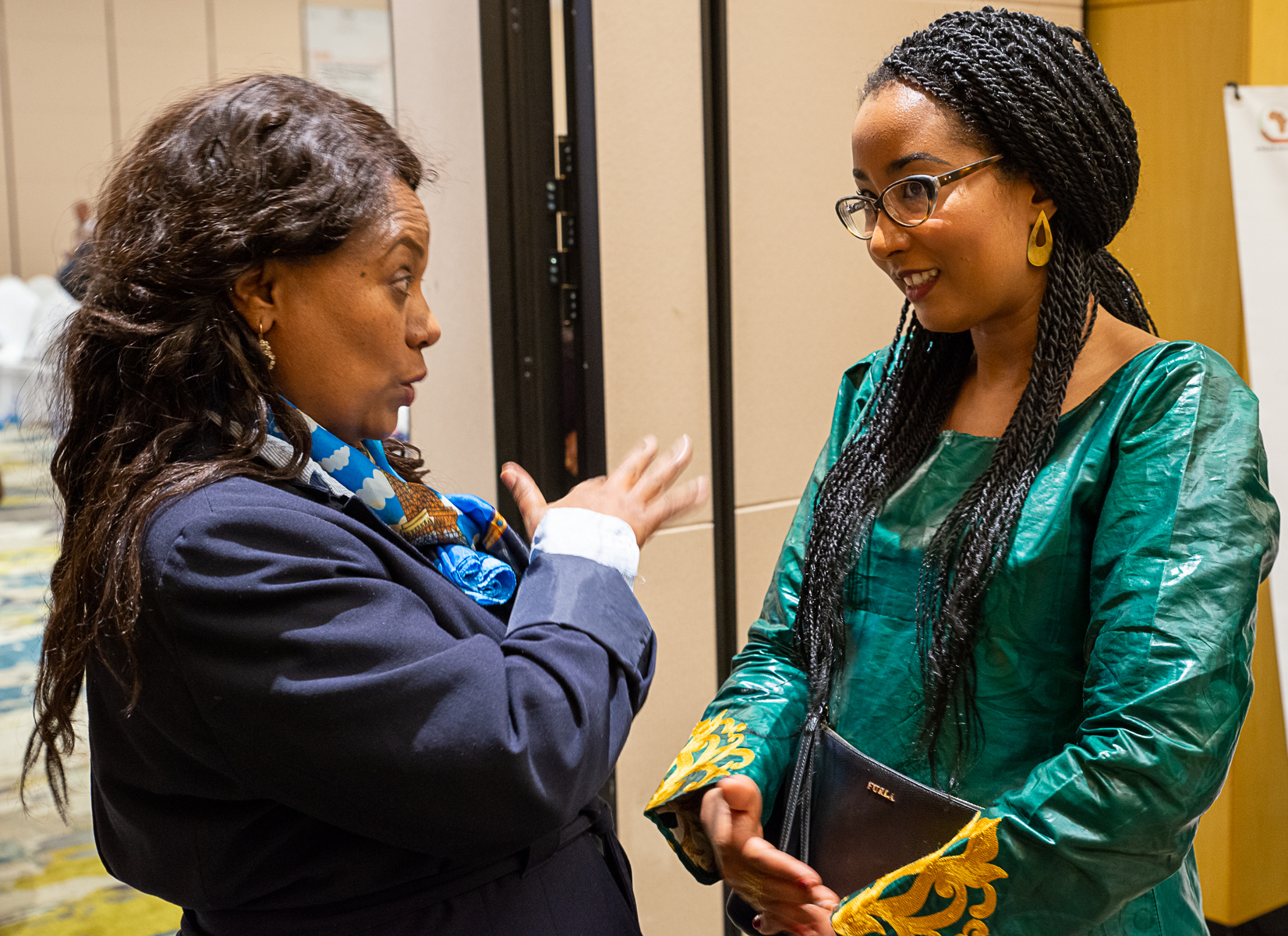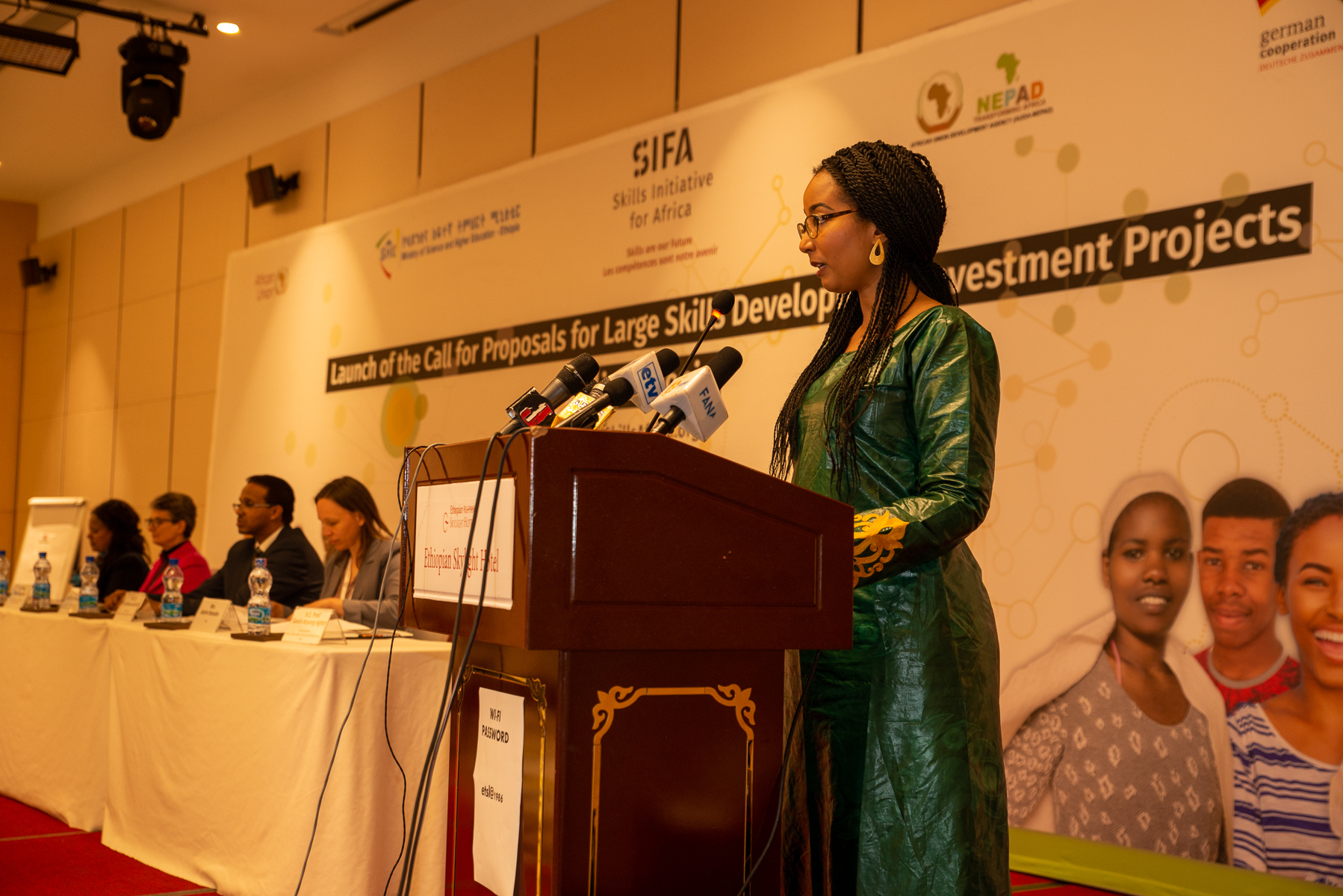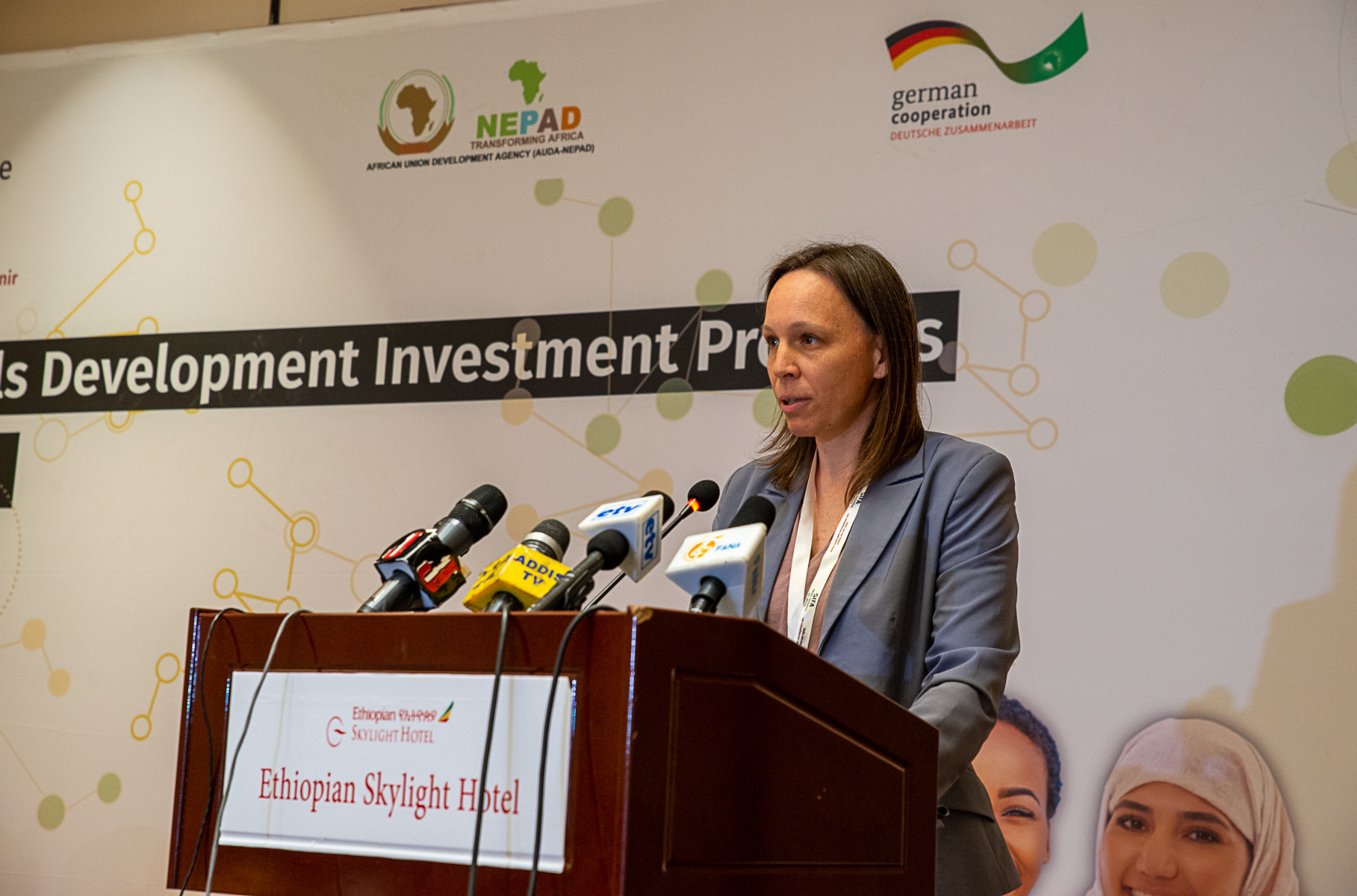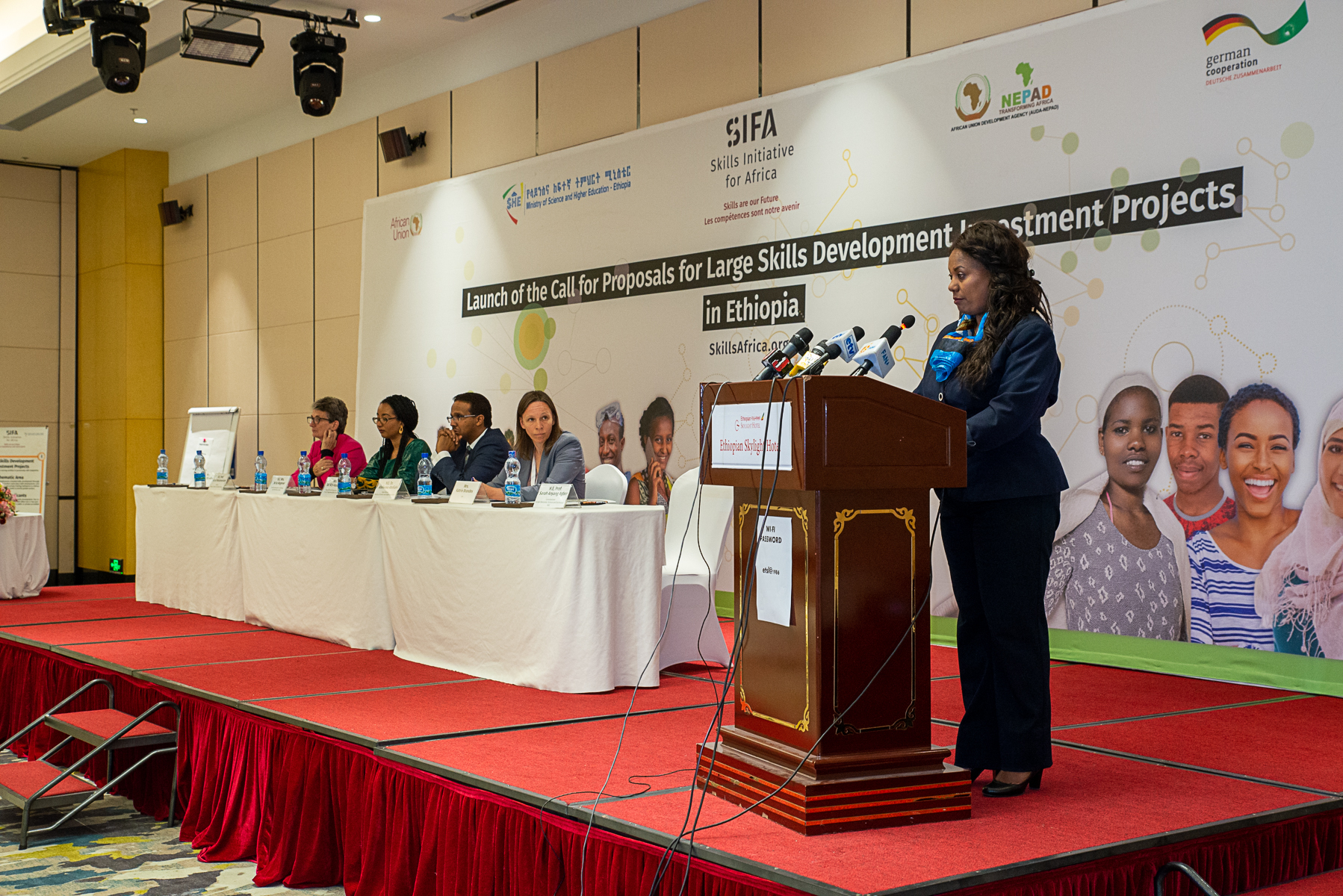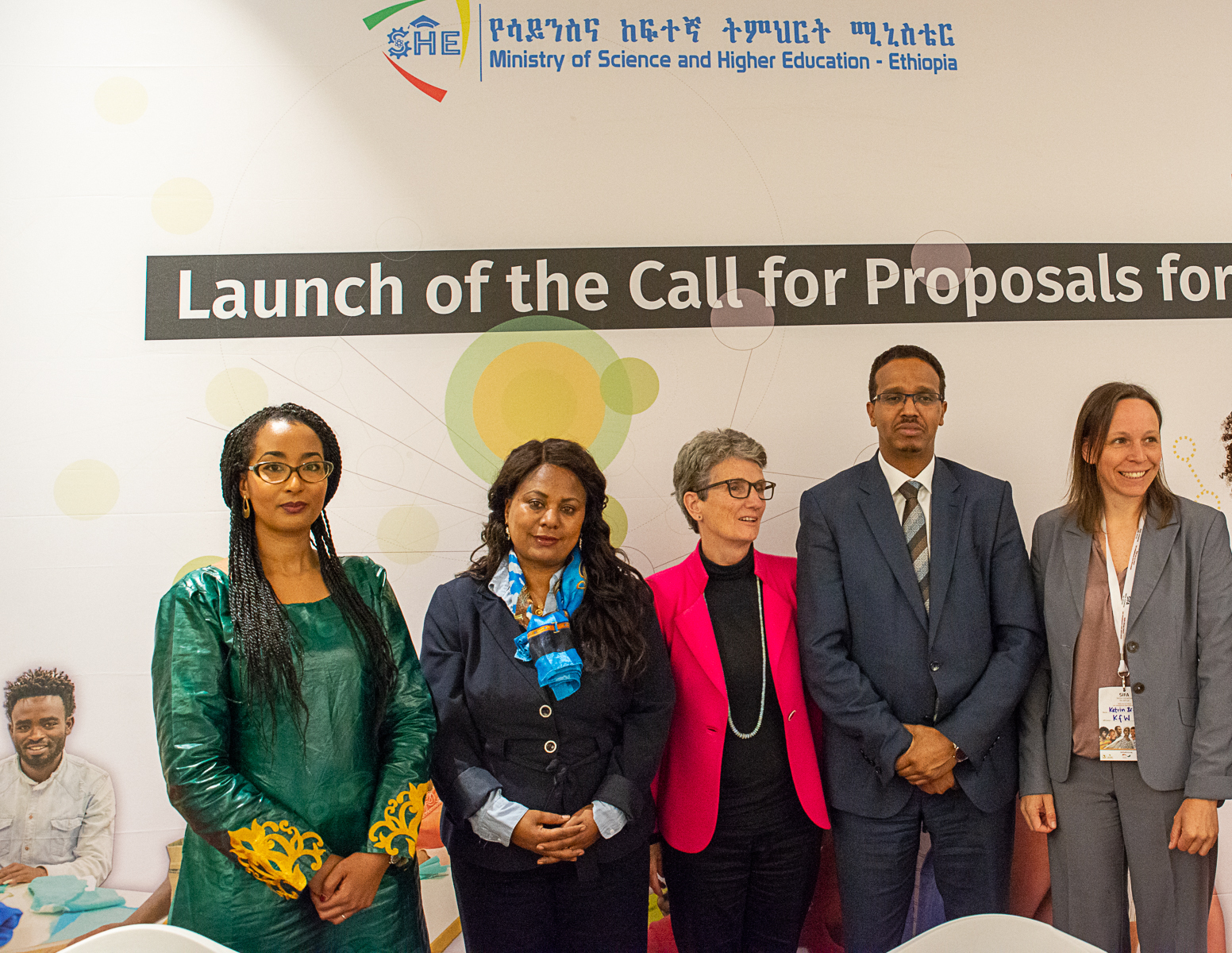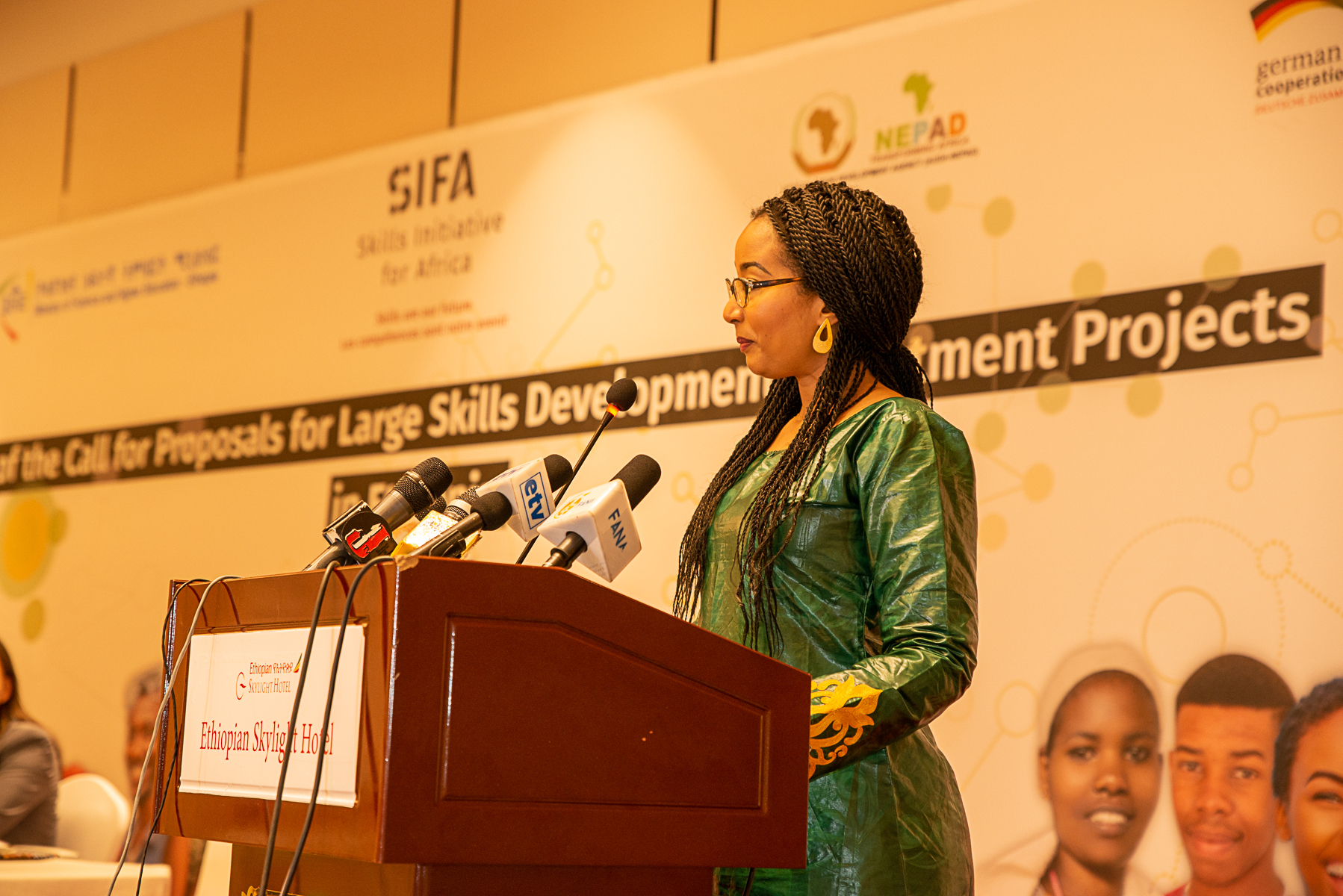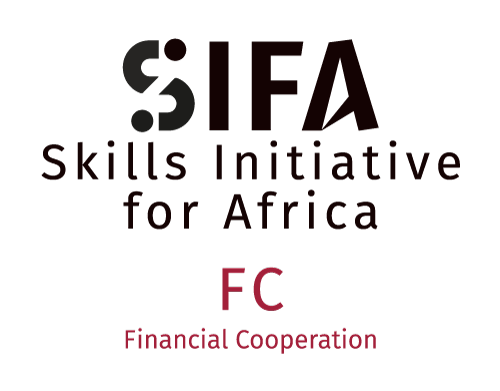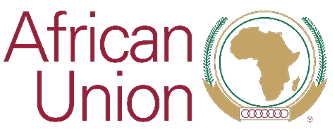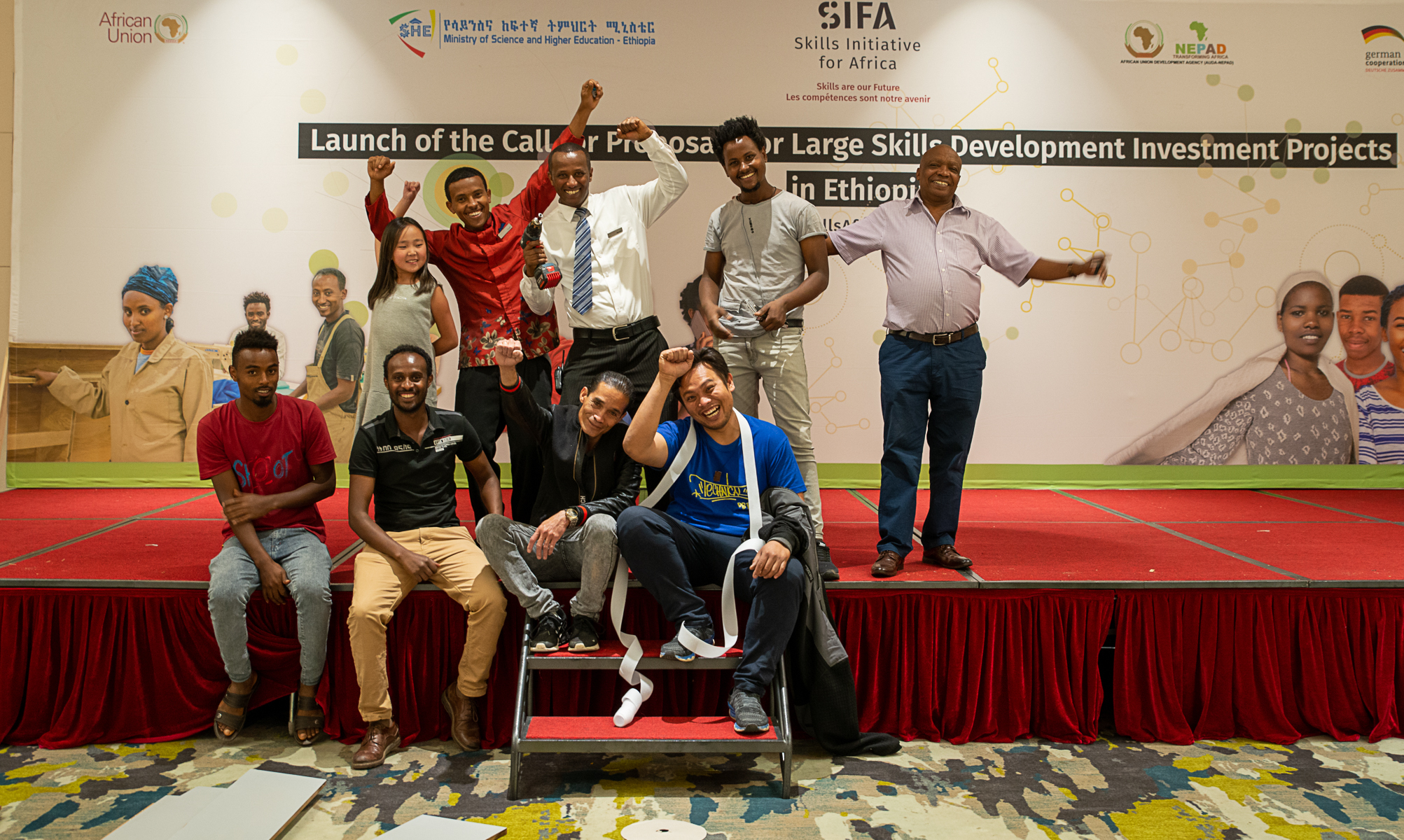
Students from the Federal TVET Institute in wood technology, Addis Ababa have built the wooden structure for the background of the banner
1. Keynote Speech by Mrs. Fati N'Zi- Hassane,
Director / Head of the "Skills and Employment for Youth" Program of the African Union Development Agency AUDA/NEPAD on the occasion of the launch of the call for proposals under Funding Window I of the Skills Initiative for Africa (SIFA) Project in Addis Ababa, Ethiopia
H.E. Prof. Hirut Woldemariam, Minister of Science and Higher Education
H.E. Mr. Ahmed Shide, Minister of Finance and Chairman of the TVET Council
Hon. Dr. Abdiwasa Abdilah Bade - State Minister of Science and Higher Education,
H.E. Prof. Sarah Anyang Agbor Commissioner - Human Resources, Science and Technology, African Union Commission
H.E. Mrs. Brita Wagener - German Ambassador in Ethiopia
Distinguished guests,
Friends from the media,
Ladies and gentlemen:
I am very pleased to finally be with you in the vibrant city of Addis Ababa for this long-awaited event and to address these few words on my behalf and on behalf of the Chief Executive Officer of AUDA-NEPAD, Dr. Ibrahim Assane Mayaki.
Hon. Ministers, Ladies and Gentlemen:
Allow me to take this opportunity to brief you on some of the institutional changes regarding NEPAD, following the recent decisions of the 55 African Union Heads of State. During the year 2018, our Heads of State agreed on the transformation of the NEPAD Agency into the "African Union Development Agency (or AUDA)", with a clear mission to support the 55 African states in the implementation of the continental development blueprint known as: "Agenda 2063: The Africa We Want". This document consists of a set of activities that include the coordination and implementation of development programs, technical assistance, and capacity building of the AU Member States.
Ladies and gentlemen,
As you may know, the NEPAD Agency or AUDA is involved in areas as diverse as infrastructure development, regional integration, agriculture and the creation of regional markets, including the emergence of an African pharmaceutical industry. All these activities and preoccupations respond to the shared concern of Africa and Africans to see the emergence of a strong, united and sovereign continent.
To reach this vision, Africa can rely on the great potential offered by its youth.
A study conducted by NEPAD in 2015 found that by the year 2030, nearly 440 million young people will find themselves on the African labor market. These young people will then be between 15 and 35 years old, which means that they are already born. They are here with us. This is not a potential or possible scenario. It is a reality that we must tackle today. If they are educated, prepared and given the right opportunities, these young people have the potential not only to contribute to achieving the Africa we want, but also to place our continent at the center of the global economic system. But if nothing or too little is done for these young people ... we are sitting on a ticking a time bomb that in many countries may cancel all the efforts and achievements so far accomplished.
We know today that technical and vocational education and training (TVET) is a powerful vehicle for equipping young people with employment and entrepreneurship skills. The Agenda 2063 that I mentioned earlier calls for a paradigm shift towards transformative education and training systems to develop the knowledge, skills, research, innovation and creativity needed to secure the future of our young people and Africa as a whole.
To unleash the potential of TVET, the African Union has developed a "Continental TVET Strategy" which provides a comprehensive framework for skills development and youth employment. Nevertheless, a shortage of qualified teachers, scholarships and adequate infrastructure, as well as the lack of practical vocational training programs and technical and didactic equipment, still constitute significant obstacles to the proper implementation of this Strategy.
It is in the light of these challenges that the African Union and the German Government have come together to launch and promote the Skills Initiative for Africa (SIFA). As part of the SIFA project, a funding mechanism for skills development has been put in place. The facility is implemented by the African Union Development Agency, AUDA / NEPAD, with funding from Germany through KfW. The funding mechanism is designed to respond coherently to the common challenges of skills development in Africa by developing and disseminating local best practices and supporting innovative and sustainable approaches, thereby promoting employment and the spirit of entrepreneurship among young people, women and other vulnerable populations. For the moment, the countries benefiting from the SIFA financing mechanism are Cameroon, Ghana, Kenya, Nigeria, South Africa, Togo and Tunisia, and of course, Ethiopia.
The expectations are particularly high for Ethiopia because of the particular interest and political will in promoting TVET, as captured in the ambitious national Growth and Transformation Plan II (GTP II). Accordingly, your Government has committed to fully mobilize the necessary resources including quality assurance monitoring and support towards TVET institutions to maintain the quality and implement the design of TVET systems in an organized manner. Therefore, government investment and cooperative training will be fully implemented to ensure the provision of human resource that will satisfy the nation`s demand for skilled human power.
Such efforts are to be saluted. They are also the reason why many African countries are turning to Ethiopia as a source of inspiration in TVET-related policy design and implementation.
On behalf of AUDA/NEPAD, I wish to reaffirm our support to the Ethiopian authorities in achieving its objectives in the field of employment and vocational training through SIFA and through any other kind of support within our mandate and our capacity. Honorable Minister, we are at your service.
Our support also goes to all potential applicants for the financing window I of SIFA.
To materialize this support, the SIFA team of experts will organize later today and tomorrow an informative session giving potential applicants a detailed and precise understanding of the application process, the eligibility criteria and the modalities for the submission of the concept notes that will be used to evaluate the projects submitted.
Allow me, ladies and gentlemen, to provide some details on the projects that will be assessed under funding window 1. As mentioned earlier, this window funds large-scale investment for skills development projects.
Projects must be proposed by Ethiopian training structures in partnership with public or private enterprises. The selected projects will receive a grant of up to 3 million €. This grant may be used to finance the construction, rehabilitation, or extension of training centers or the purchase of modern training equipment. In addition, activities such as the design of training programs, training of trainers and scholarship programs for learners may be funded under certain conditions to be specified during the technical session.
Hon. Ministers, Ladies and gentlemen,
Skills Initiative offers all of us, in the eight countries of implementation, with the support of the development partners, an opportunity to experiment new approaches in the field of TVET. We hope that the principle of competition, combined with the engagement of the private sector, local and international, will help generate experiences and best practices that will benefit African countries beyond the current scope of SIFA.
We are grateful for the opportunity to explore this unchartered territory, with a strong support of Member States such as Ethiopia. We are aware of the expectations and of the challenges, but we believe that the solutions to the issues faced by our continent will not be found and implemented by doing the same thing and expecting a different result.
Please allow me to end with a few words by Kwame N’Krumah, that were reminded to me by one of our team members, and that have guided my work since then:
"The task ahead is great indeed, and heavy is the responsibility; and yet it is a noble and glorious challenge –
A challenge which calls for the courage to dream,
The courage to believe,
The courage to dare,
The courage to do,
The courage to envision,
The courage to fight,
The courage to work,
The courage to achieve - to achieve the highest excellence and the fullest greatness of man.
Dare we ask for more in life?”
I thank you.
2.
Dr. Abdiwasa Abdilahi, State Minister, Ministry of Science and Higher Education
Welcome and Opening Remarks
SIFA – Ethiopia Project Launch Programme, 10th July/2019, Addis Ababa
Your Excellency, Mrs. Brita Wagener, German Ambassador to Ethiopia and to AU
Commissioner, Human Resources, Science and Technology, AUC
Your Excellency Mrs. Fati, N’ZI Hassane, Head Skills and Employment for Youth (SEFY), AUDA-NEPAD
Mrs. Katrin Brandes, KfW
Director of GiZ - AU
Your Excellencies and Ambassadors present
Friends from the media
Excellencies,
Ladies and gentlemen,
On behalf of Ethiopian Ministry of Science and Higher Education, it is my honour and privilege to welcome all invited to this occasion – the launching of the Skills Initiative for Africa (SIFA) Project, which makes Ethiopia one of the eight participating countries along with Cameroon, Ethiopia, Ghana, Kenya, Nigeria, South Africa, Togo and Tunisia.
First of all, I would like to thank Mrs. Fati N’zi Hassane, Head Skills and Employment for Youth and her Team at AUDA-NEPAD for making this important event a reality.
Our thanks go especially to the African Union Commission, represented here by Higher Officials from the Head Quarters here in Addis Ababa, for initiating SIFA and acquiring the required financial support from the German Government with a view to strengthen occupational prospects of young people in Africa.
I highly welcome the presence of all potential competitors to benefit from the Financing Facility for Skills Development established under SIFA to provide funding African entities and TVET programs with innovative and sustainable skills development project proposals on a competitive basis.
As has been said, now and then, countries in Africa are naturally endowed with unlimited and a diversity of natural resources. More than half of our population is under 25 years of age, a very positive indicator for a high potential for development. But, it is unfortunate; the Region has still remained as a home to the world’s poorest population and high unemployment levels.
The continent is characterized by ever-growing demand for market-oriented skills from both the public and private sector. On the other hand, high youth unemployment is alarmingly posing a fundamental challenge for the African continent. In total, around 60 percent of unemployed people are under the age of 25 and young women are the majority.
This multifaceted dilemma has challenged and moved governments and regional organizations, like the African Union, to discover and activate the missing link in developing the necessary skills among the youth to properly add value on our natural resources and bring about the economic, social and political transformation.
African TVET providers are struggling with widespread low funding, shortage of modern training facilities and equipment, lack of industry driven programs with modern curricula and pedagogy, and teachers/trainers with low competency and low pay. This calls for urgent policy attention, financial, and technical support as well as capacity building interventions at the grassroots In response to these challenges the African Union Commission (AUC), the NEPAD Agency and the German Development Cooperation initiated the Skills Initiative for Africa (SIFA), a programme run by the AUC’s Department of Human Resource, Science and Technology Department, in cooperation with the German Federal Ministry for Economic Cooperation and Development (BMZ) and its development agencies.
This launch will be an opportunity to learn more about the programme, including the process through which TVET institutions and other skill development entities should go to ultimately benefit from the programme.
Excellencies,
Ladies and gentlemen,
Before I leave the floor, I would like to assure my Ministry’s readiness to work with you all to make this project a success.
I wish you all a happy stay with us!
Thank you!
3.
Mrs. Brita Wagener, German Ambassador to Ethiopia and the AU
Your Excellency Prof. Hirut Woldemariam (Minister of Science and Higher Education),
Your Excellency Prof. Sarah Anyang Agbor (AU Commissioner for Human Resources, Science and Technology),
Your Excellency Ahmed Shide (Minister of Finance, Chairman TVET Council),
Your Excellency Dr. Abdiwasa Abdilahi (State Minister, Ministry of Science and Higher Education),
Esteemed Fati N’Zi Hassane, Head of Skills and Employment for Youth Programme, AUDA-NEPAD,
Distinguished guests,
Many African countries have shown above-average economic growth for years (averaging 4,6% annually) – much higher than Latin America and the Caribbean, yet lower than developing Asia (7.2%).
But: This growth did not create enough jobs, not to mention quality jobs. Africa’s growth remains largely volatile and is exposed to external commodity shocks.
With regards to the very young and still growing population of Africa this remains a challenge – just some figures to illustrate this challenge:
Every year more than 20 Mio. young people enter the labour market seeking to earn a living for themselves
But: 42% ot the working youth live on less than 1.90 USD per day
Only 17% of the working youth (7% of all youth) are full-time employees
60 % of all unemployed people in Africa are under the age of 25.
How can we match the growing number of unemployed young people with the needs of the growing economies?
And:
How can sustainable and inclusive growth be maintained? The answer to these questions are manifold: regional integration, industrialization, the creation of regional value chains, education, increase of productivity are just a few to mention.
Our host country, Ethiopia, has embarked on some demanding reforms which point directly into this direction.
But this is not the main topic of my intervention today – today I would like to concentrate on qualified jobs which form a prerequisite for diversified economies, thus creating value chains and supporting long-term growth. And qualified jobs need qualified workers.Coming from Germany with a long-standing tradition of qualified and proud artisans we have the skills, expertise and tradition in educating and training young people which we are ready to share.
Fortunately our comparative advantage and the strategy of the African Union on Technical Vocational Education and Training (“TVET”) match in many aspects. The African Union has analysed that too often young peoples’ skills do not meet the needs of a modern labour market.
Very often the education and training is detached from the required skills at the workplace. One very practical solution which has shown excellent results all over the world is the involvement of the private sector in curricula development and education and training itself.
This means: the trainees learn what future employees really need – very practical, hands-on, very labour-market orientated and with good opportunities for future employment. In turn, the private sector may contribute in technical and financial terms to an education that meets its demand.
Here in Ethiopia we have practiced this way of training and learning with the immediate involvement of the private sector for decades. And with the new reformpartnership between Ethiopia and Germany we will continue on this path.
But I am delighted that the African Union and its implementing agency AUDA-NEPAD have taken a similar direction – and have designed the “Skills Initiative for Africa” in 2015.
It is the Skills Initiative’s declared objective to promote knowledge exchange for better demand-oriented skills development in Africa with strong involvement of the private sector and to collect and spread good-practice examples.
There is already a number of positive examples in Africa. Ethiopia has already has put in place a comprehensive set of policies and gained broad experiences in TVET. This is why it was selected to act as a pilot country for the Skills Initiative for Africa, together with Tunisia, Nigeria, Kenya, Cameroon, Ghana, South Africa and Togo.
Germany has supported the African Union and AUDA-NEPAD in their Agenda 2063, that calls for a Skills Revolution in Africa, and in the implementation of the Skills Initiative from its very inception in 2015 – started by the then-Chairperson Mme Dlamini-Zuma.
We have already made available 74 million EUR for this initiative which works with the mentioned pilot countries and shares the knowledge on a continental level. One important goal of this initiative is to bring the public and the private sector together and to create incentives for African companies to train African young people in the required skills
It should also be mentioned that the European Union has joined this important initiative recently. So it is truly a continent-to-continent initiative, building on our long-standing partnership and delivering on the action plan of the last AU-EU summit.
But for me this initiative has another positive effect which I would like to mention here. As Germany supports African countries bilaterally and the African Union on a continental level – this initiative brings together both aspects: continental exchange, policy making and knowledge sharing with very practical benefits for African Union member states. So we are able to combine our efforts on these two different levels and can illustrate that the African Union can have very positive impacts on country level. In that regard I assume that the Skills Initiative for Africa will contribute to the continent’s integration which is an ingredient for well-being and development as we have experienced in Europe.
Before concluding I would like to raise a very last topic to all representatives in the audience: Please use all your efforts to lobby for a positive image for technical vocational education and training! Our aim should be that TVET institutions and training in private companies become students’ and parents’ first choice for education! Here are the jobs for the future – and here are the jobs which can sustain long-term and inclusive growth! Let’s advocate for a shift in mindsets towards this very successful pathway which will form the backbone of growing economies.
I would like to thank the Commissioner for Human Ressources, Science and Technology, Prof. Sarah Anyang Agbor, for her political commitment!
Thank you Ms Fati N´zi Hassane for doing such an excellent job in executing the new mandate of A-U-D-A NEPAD as the implementing agency for the Skills Initiaitve; we look forward to our continued partnership and cooperation.
I am also happy to see many representatives of the public and private sector here at this event, TVET-institutions as well as public and private employers.
I hope that many of you will feel encouraged after this event to apply for funding from the Skills Initiative for your new T-VET Project!
With that being said, I would like to congratulate the Government of Ethiopia for becoming one of the Pilot Countries of the Skills Initiative. Finally, I would like to also thank Minister Hirut Woldemariam for leading this initiative in Ethiopia, that is of such high importance not only for this country, but for the continent.
4.
Message from Katrin Brandes, KfW
We see a growing level of youth unemployment: average age in Africa 19 years, 41% under 15 years old, who will soon try to find a job. At the same time, industries need well-educated workers for sustained growth, which is a huge potential!
The African Union Commission and Germany have therefore intensified cooperation in the field of education and employment, by establishing the Skills Initiative for Africa (SIFA). Germany has made a substantial financial contribution to the Project, complemented by funds from the Member States of the African Union.
As part of the Skills Initiative, the African Union Development Agency (AUDA) and KfW have set up a Financing Facility to provide funding for improved, innovative TVET approaches across the continent.
The Financing Facility is implemented by AUDA with funding from Germany through KfW. We would like to take this occasion to thank AUDA for the excellent collaboration on this Project.
We are particularly proud to be one of the major partners on this important project with AUDA which has been officially confirmed by the African Union as the implementing agency of the African Union Commission.
Today, AUDA and the Government of Ethiopia launch the call for proposals under Funding Window I of the Financing Facility. Grants will be provided on a competitive basis for the best project proposals.
So please feel encouraged to apply, if your training institution, company or agency wants to implement a TVET project that
combines the knowhow from employers and training institutes, from the public as well as from the private sector
harnesses local know-how as well as international best practices by cooperating with local and with international actors,
strengthens your sustainable business model,
creates more and better employment perspectives particularly for women and girls,
It is worth the effort: the winner will be granted up to 3 Million EUR for infrastructure, equipment and further needs of your training facility.
Congratulations to Ethiopia for having been selected as one of the eight beneficiary countries under the Skills Initiative.
5.
Prof. Hirut Woldemariam, Minister, Ministry of Science and Higher Education
Your Excellency, Mrs. Brita Wagener, German Ambassador to Ethiopia and to AU
Commissioner, Human Resources, Science and Technology, AUC
Your Excellency Mrs. Fati, N’ZI Hassane, Head Skills and Employment for Youth (SEFY), AUDA-NEPAD
Mrs. Katrin Brandes, KfW
Director of GiZ - AU
Your Excellencies and Ambassadors present
Friends from the media
Excellencies,
Ladies and gentlemen,
On behalf of the Minister H.E. Mr. Ahmed Shide, Minister, Ministry of Finance, Chairman TVET Council it is my honour and privilege to meet you all here at this occasion – the launching of the Skills Initiative for Africa (SIFA) – Ethiopia Project.
The Ethiopian Government appreciates the financial and technical assistance from our development partners and it highly values greatly the significant commitment from the African Union (AU) for establishing this funding facility through the New Partnership for Africa’s Development (AUDA-NEPAD) and through our long standing TVET supporter the Government of Germany for providing funding opportunity for African TVET programs with innovative and sustainable skills development project proposals on a competitive basis.
This is an outstanding
Public and private TVET institutions and companies, industry development institutions and other skills development stakeholders invited, I sincerely welcome your presence and take it as a sign of your willingness to be part of the project.
I would like to begin with a few words about the broader context of Technical and Vocational Education and Training (TVET) and skills development in Ethiopia.
TVET in Ethiopia constitutes any form of education, training and learning activity leading to the acquisition of practical knowledge, understanding and skills relevant for gainful economic engagement, both formal and informal. We consider quality and relevant TVET system as critical for supplying the industry with competent workforce that has the necessary capacity to contribute to the effective implementation of the Growth and Transformation Plan (GTP) of the country.
In addition to our engagement in changing the public perspectives towards TVET and fully unlock its potential in the country, my Ministry, in cooperation with all relevant stakeholders, has embarked on resolving problems hindering the implementation of the National TVET Strategy. This is mainly being done through actualization of remedial actions recommended as part of the roadmap to reform the education and training system as a whole.
In order ensure righteous implementation of the strategy, the Government has established and empowered various bodies at federal level. These include the Federal Technical and Vocational Education and Training Agency (FTA),which is mandated to regulate and standardize, training in the different Regional States and City Administrations of the country through development of Policy Documents, Qualification Frameworks, Occupational Standards, Implementations Guidelines and Working Manuals as well as monitoring evaluation.
The Federal TVET Institute (FTI) is established with full mandate to produce TVET trainers and leaders as well as facilitating practical research works on issues pertinent to TVET.
In order to get all socio-economic sectors leading Ministries/Bureaus, Industry Organizations as well as Civic and Professional Associations on board to contribute for effective TVET, federal and regional TVET councils are established as an apex part of the Governance of their respective administrative levels.
Yet, the latest roadmap study on the Ethiopian education and training as a whole has shown us that the system lacks appropriate institutions to independently execute activities with regard to quality assurance, curricular materials development and evaluative research. The system is not yet in a position to fully exploit state-of-the-art technologies and address the demand from the industry for high skilled workforce. Out of the 670 public institutions, 63 are Polytechnics, situated in relatively populous and industrial towns and regional cities.
Currently, there are 670 public and a good number of private institutions operating with nearly 24,000 certified teachers and reaching yearly enrollment of about 450,000 trainees in the formal and around 800,000 trainees in the non formal (short term) training.
However, we are still far behind from achieving our goal to earmark every Woreda with a TVET institution, as a measure to enhance access and equity in the country of 108 Million populations. And all TVET providers are struggling with widespread low funding, shortage of modern training facilities and equipment, lack of industry driven programs with modern curricula and pedagogy, and teachers/trainers with low competency and low pay
Excellencies,
Ladies and gentlemen,
Today we all have learnt that we will be having SIFA Project with a Financing Facility for Skills Development designed to coherently address the common challenges in skills development by up-scaling and/or disseminating local best practices. This is done through supporting innovative and sustainable approaches to advance employment and entrepreneurship of youth, women and vulnerable groups including refugees, migrants and internally displaced persons.
As the provision of the funding is on a competitive basis, I would like to remind all public and private entities, invited from across the country to attend this event, that my Ministry considers you all as potential competitors. By virtue of being here, today and tomorrow, you are expected to take the full responsibility of understanding the project requirement, take your assignment and come with competitive proposals. Bringing additional resource for the system and for the good of citizens highly depends on you effort to take advantage of this opportunity.
Fortunate enough, you are not left alone; the Ministry and the project country consultant will continually provide their technical support alongside your effort in developing your proposal.
Excellencies,
Ladies and gentlemen,
Before I end my speech, I would like to take this opportunity to thank the German Government through the African Union Development Agency (AUDA-NEPAD), the industry sectors, civic and professional communities as well as the public at large for continually partnering with the Ministry of Science and Higher Education in activities specially geared towards supporting the ongoing Government efforts to make TVET efficient and effective.
With this, I declare the event opened and assure my Ministry’s readiness to work with you all to make this project a success.
I wish you all a happy and successful stay here in Addis Ababa!
Thank you!
Please see Photos in the gallery, credits

